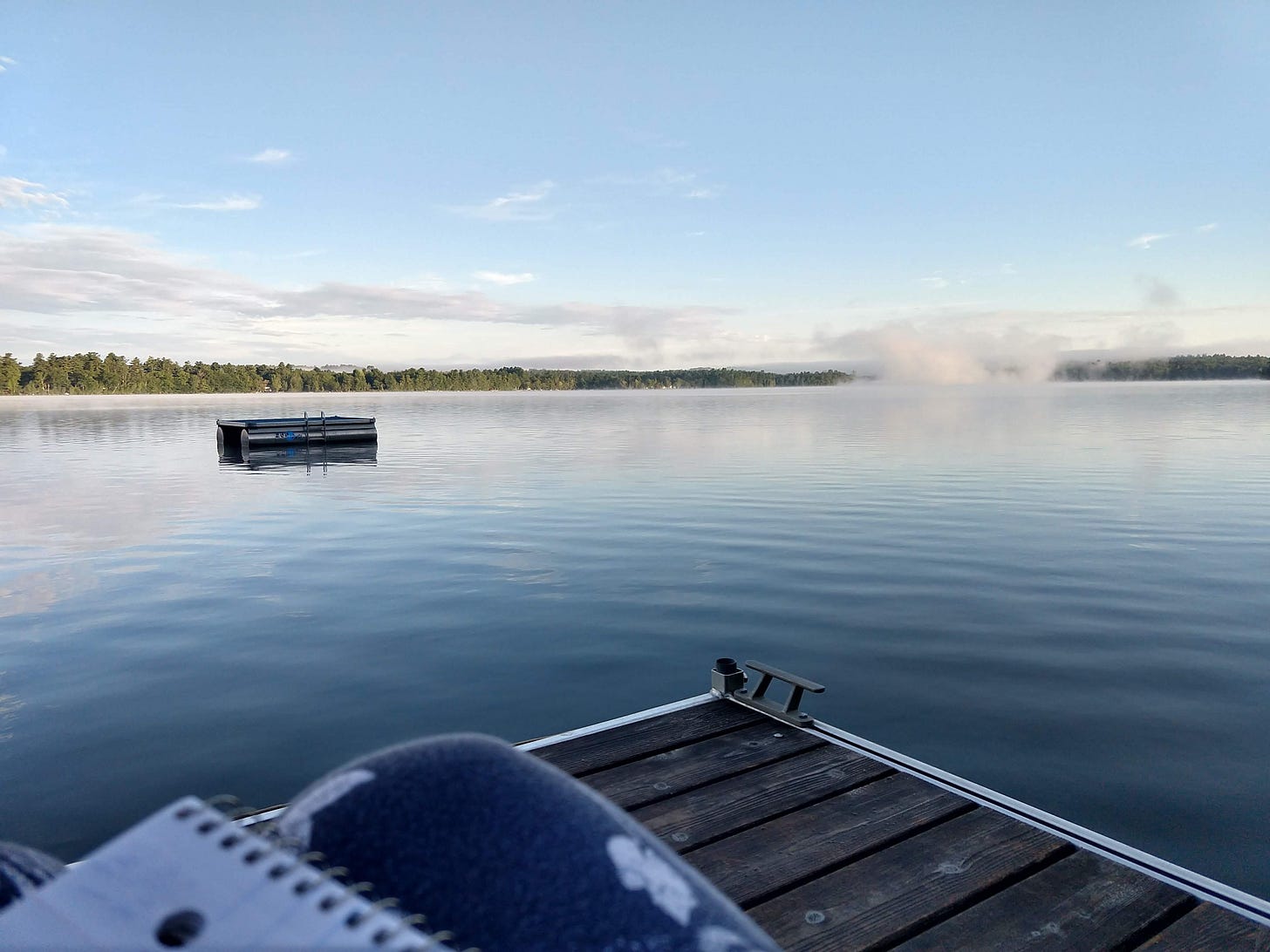Writing a Trauma Memoir
Abandon all Hope, Ye Who Enter Here
On a rainy summer afternoon in 2010, my husband Todd and I left our three teenagers reading and napping at our rented cottage on one of the Belgrade lakes and drove his rusty pickup to the Barnes & Noble in Augusta.
I was deep in evangelicalism then and had read most of the books in the religion section. I rolled my eyes at the syrupy Amish romance novels and the poorly written end-times series. Though I was still wholly brainwashed, a sliver of my intellect recalled the college literature classes I’d taken where I swooned over Steinbeck, Maya Angelou, Louise Erdrich, and Leslie Marmon Silko. Books I could take a juicy bite out of and chew slowly.
I wandered past Dan Brown thrillers and the latest Stephen King, and paused at a table full of Notable Nonfiction. A bright white cover designed as though it had been sliced top to bottom and side to side, revealed tinges of red and black along the edges.
Lit, a memoir by Mary Karr, author of The Liar’s Club and Cherry.
I had never heard of her.
The back cover said: Lit is about getting drunk and getting sober; becoming a mother by letting go of a mother; learning to write by learning to live.
My scalp felt tingly. I had given up writing for God years earlier, but still missed it. I flipped to the first chapter and skimmed a few lines.
Age seventeen, stringy-haired and halter-topped, weighing in the high double digits and unhindered by a high school diploma, I showed up at the Pacific Ocean, ready to seek my fortune with a truck full of extremely stoned surfers.
Electricity pricked the back of my neck. I quickly shut the book. This was a memoir? I thought of the dry, heavy, leather bound histories Todd kept at home on a bottom shelf. Roosevelt. JFK. Saint Augustine.
But this book felt alive.
Karr’s voice jolted me. Stringy-haired, halter-topped. Unhindered by a high school diploma. I could feel the bottoms of my Birkenstocks flat on the industrial carpet, but my body had begun to float. What language was this? Who wrote like that? It read like poetry.
I clutched the book to my chest as though it might dart away like the large-mouth bass Todd had been trying to hook in the lake a dozen miles up the two-lane.
I hurried to the register.
Todd drove us back up Route 27 past Wendy’s, a sprawling gas station, and rolling forests of oaks and birches thick with August foliage. Messalonskee Lake stretched out to the right just before we turned. Our cottage huddled off a gravel road under hemlocks and maples that shadowed the mossy logs and cool water.
But I didn’t see any of it.
I’d slipped under the murky surface of Mary Karr’s voice. Her story grabbed me by the hair and pulled me in, and I’d have followed her all the way to the oily southeast Texas coast.
The next morning, I took my spiral notebook to the sunny dock and crafted a few scenes from my own chaotic childhood. But it felt subversive and dangerous. I worried my mother might sense them all the way from the west coast. For years, I’d tried to figure out why she still intimidated and paralyzed me. I was forty two. Would I never get over it?
Five years later, as I began to question religion, I joined a writing group at the Freeport Library. Five women closer to my mother’s age than mine shared essays, stories, and poems. My voice quivered as I read my own. Their feedback centered on my writing, but then the leader looked into my eyes with a concerned frown.
“What your mother did was wrong.”
The others nodded and in that moment, I felt as though I’d been surrounded by a coven of mothers who would soothe and heal my ravaged heart.
I kept writing, kept going to the group, found a therapist, and ultimately left religion.
Another five years passed. My fellow MFA students said my stories didn’t ring true. They lacked emotion. My narrator self was strangely stoic and silent in the face of abuse and pain.
But that was true.
So I went back for more therapy to mine the feelings that had been there, but had been stuffed into a vault deep inside my psyche.
That’s when the real work began.
I dug for feelings that I’d once prayed I’d never have to feel. Feeling them all those years later was even more poignant and painful than I imagined. But I sat with them. I endured the discomfort until all the true feelings made themselves known.
Then I learned how to write them in a way that others would feel them, too.
It was an exhilarating, frightening, empowering, and grueling process.
I’m still excavating the feelings today, but only small fragments remain.
The book is almost finished.
I’m nearly there.
Some Beautiful Things
________________________________________
Thank you for Reading. Be gentle with yourself this week.



I remember when you read Lit because I remember you telling me about it and me buying it and reading it in 2011 based on your recommendation. But I never knew what it ignited in you. I can't wait to read your memoir.
This makes me very excited to read your book! Keep going - you have such an important story to share.